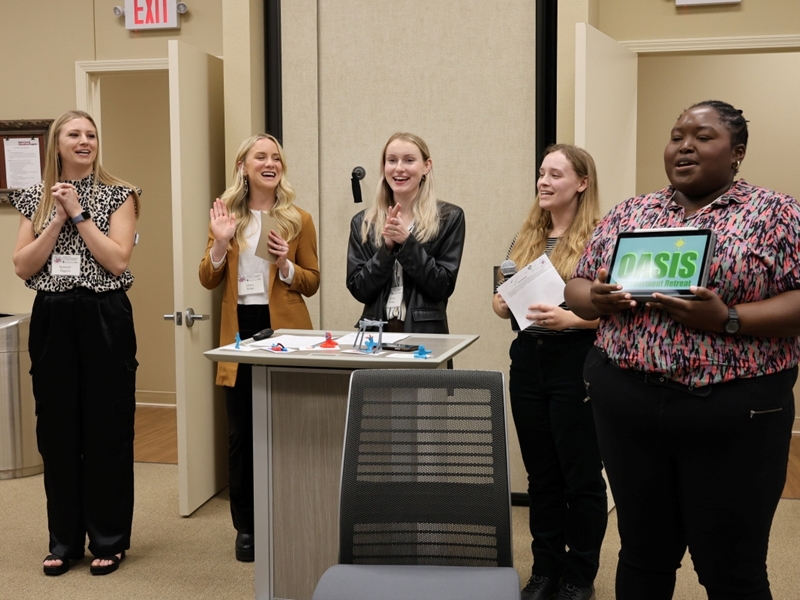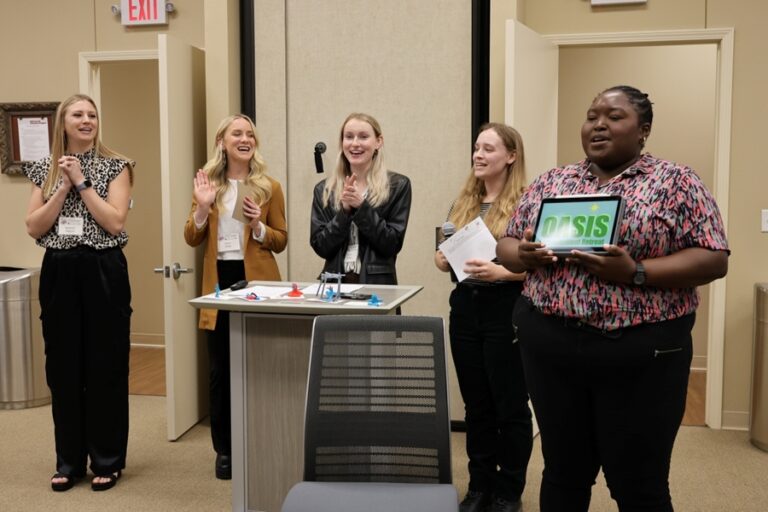
The winning team from I4H Academy hosted the Oasis Empowerment Retreat, a summer camp for young people with disabilities.
The College of Education and Health Professions recently hosted the first Innovate for Healthcare (I4H) Academy, which featured Shark Tank-style student presentations focused on improving access to health care in Arkansas.
The interactive one-day workshop held on April 5th was attended by 20 students and 11 health teachers and community experts. Top students from a variety of the university's medical programs participated, including nursing, counseling, communication disorders, occupational therapy, athletic training, exercise science, and public affairs. Health — We collaborated while learning about innovation and entrepreneurship.
“That's the beauty of this university,” said keynote speaker Judd Seminson, CEO of Northwest Arkansas Community Clinic. “Everyone needs to be at the same table to decide how to get better outcomes for patients.”
Seminson, who trained as a nurse, said innovation doesn't necessarily mean creating a product. Sometimes it revolves around processes. He encouraged students to scrutinize gaps in the care process that they may encounter with patients in the future. “That gap provides an opportunity for creation and innovation,” he says. “We can have an impact.”
This workshop focused on “Access to Quality Care in Arkansas” through the lens of empathy. It was facilitated by Jessica Salmon, who has extensive experience leading companies and communities through design thinking processes. She led the group through a series of prompts designed to help them brainstorm solutions to problems real Arkansans face.
“It all starts with a place of empathy,” Salmon said, noting that empathy allows us to connect with others, which leads to vulnerability and transparency. “That way we can listen to their needs,” she said. “It becomes, 'How can we solve the problem?'” We're all in the position of identifying problems and solving them. ”
Students collaborated in breakout sessions with faculty and medical professionals to prototype products that would help “patients.”
Dean Kate Mamiseishvili created the I4H event to increase students' knowledge of innovation and entrepreneurship methods and equip them with practical tools and resources.
“In care work, you often have a lot of empathy, but you don’t always have the business know-how,” she said. “But because they see patients' daily struggles, they are the most knowledgeable about how to resolve those conflicts.”
The I4H Academy is one of the key action items in the WE CARE Strategic Plan, which aims to foster innovation and entrepreneurship in response to Arkansas' education and health challenges.
Students found collaborating with peers from other programs within the university to be eye-opening and energizing. “Working with students from a variety of health professions allowed us to think of solutions in ways we hadn't before,” said public health student Grace Nolen. “I am grateful for this experience.”
Duffy Parker, an occupational therapy doctoral student, said, “This exceeded my expectations. I enjoyed working with the faculty and community members. We learned from them and made great connections. ” he added.
Chloe Denton, an exercise science major, said she was initially intimidated. However, she quickly hit it off with her team and enjoyed discussing patient scenarios to create innovative products. Denton said the day was fun and constructive for her. “On the test, there is only one correct answer, but in the real world there are multiple solutions,” she said.
Four student teams pitched their products to three faculty judges. The winning team proposed an “Oasis Empowerment Retreat.'' This is a summer camp where young people with disabilities who are no longer eligible for pediatric medical support due to old age can learn life skills while enjoying a fun community experience.
The judges challenged the students and the students successfully defended their ideas.
The final event of the day was a fireside chat with local clinicians about how innovation has accelerated their careers. Leanne Hill from the community clinic said she was impressed by the students' questions and outlook for the future. “They give me hope,” she said.
Mamiseishvili quickly received feedback that the academy should be held regularly on campus. Attendees who responded to a post-Academy survey said they would like to see the event expanded to multiple days. Another commenter said they wanted to spend the semester addressing real issues in Arkansas.
“Thank you to everyone who participated in our first I4H event,” she said. “They brought creativity, an openness to learning, and a collaborative spirit.”
About the College of Education and Health Professions: The six academic departments in the College of Education and Health Professions prepare students for a variety of careers in education and health professions. In addition to its longstanding role of preparing educators and educational leaders, the university also trains nurses, speech-language pathologists, public health professionals, recreation and sports professionals, counselors, occupational therapists, athletic trainers, and exercise scientists. I am training.


